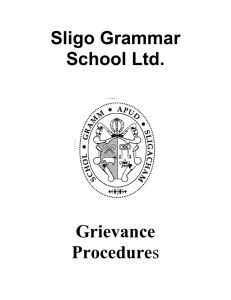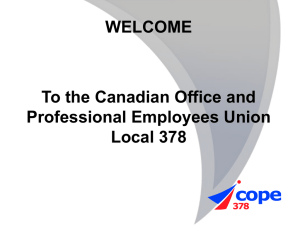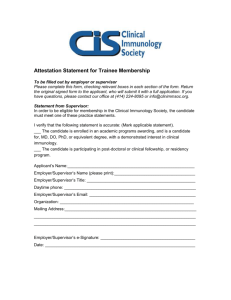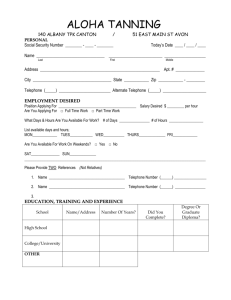the supreme court on past practice
advertisement
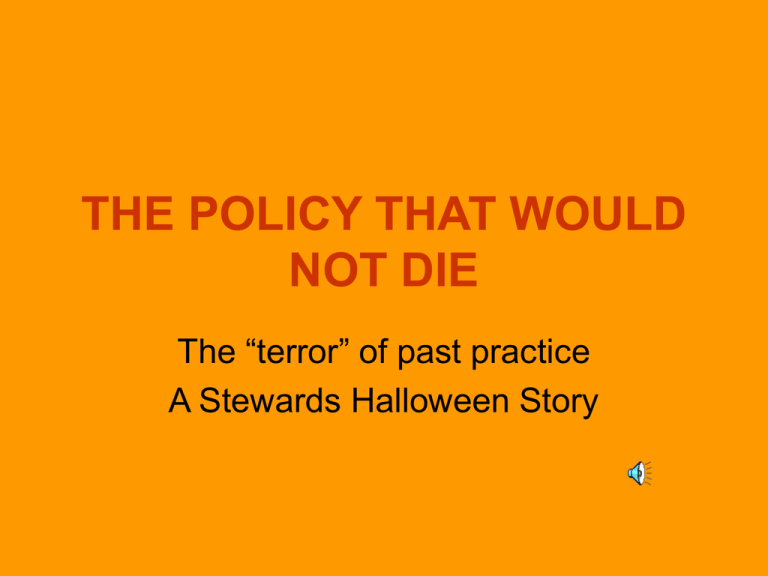
THE POLICY THAT WOULD NOT DIE The “terror” of past practice A Stewards Halloween Story STEWARDS COUNCIL TRAINING Enter if you dare! Manager’s Lament “Every time I try to make changes, the UPE steward says I have to follow past practice” Those old practices rise up So what is a “Past Practice?” Definition • Past practice is the term used to describe a pattern of workplace behavior that is sufficiently clear, of long enough duration, and well enough known to both management and union officials to constitute an unwritten rule or policy. To qualify as a bona fide past practice, such a pattern of behavior must also involve a condition of employment of bargaining unit employees, and must not conflict with applicable laws. Once established, essentially by unwritten consensus or silent toleration, a past practice becomes just as enforceable as a formally negotiated workplace rule that is placed in writing by the parties. That is, it may be enforced through application of the ULP procedures of the statute and the negotiated grievance procedure of a labor agreement. Courts and arbitrators have upheld Past practice THE SUPREME COURT ON PAST PRACTICE The Supreme Court explained the legal status of past practice in 1960: The collective bargaining agreement covers the whole employment relationship. It calls into being a new common law -- the common law of a particular industry or of a particular plant... [T]he industrial common law -- the practices of the industry and the shop -- is equally a part of the collective bargaining agreement although not expressed in it.1 Past practices can be enforced A past practice based on a mutual agreement between the parties is part of the contract. If the employer ignores, departs from, changes or eliminates the practice, the union can grieve it. Is it a past practice? Your first step is to confirm that the conduct satisfies the threshold requirements: • longevity • repetition • consistency • knowledge • acceptance Longevity • To be considered a past practice, the behavior must continue for a substantial amount of time. In other words, if something happens for a short time or in response to a one time event, it is likely not going to be considered “past practice.” • The supervisor wants to “thank” the staff for finishing a difficult project, so she allows them all to leave 15 minutes early every Friday for the rest of the month. After that everyone is again required to stay until the end of their shift. Even though the behavior is repeated for 3 weeks, it doesn’t occur over a long enough period of time to be considered a past practice. Repetition • The behavior must be repeated. Just because something occurs once or twice, even if management is aware of it, does not make it a past practice. • An example: workers are normally required to use vacation time when they are late to work, but the supervisor had a rare, soft-hearted moment and allowed a worker who was out of vacation time because he had just returned to work after a serious illness to make up the time at the end of the day. Since it only happened once, it does not create a past practice. Consistency • To be considered a past practice, the behavior must be the usual response to a situation. • For example, one year management gave everyone a box of chocolate for the holidays, the next year they gave out only 10 boxes by a drawing. Another year they didn’t give out any candy but gave coupons for $1.00 off Sees Candy. This was followed by a year in which they again gave everyone candy and then a year in which they gave no one candy. The behavior is not consistent enough to become a past practice. Knowledge • Both management and the union must have knowledge of the practice. • For example: A supervisor has quietly been ‘delaying’ workers step increases by the number of days they were absent in the previous year. When a worker raises the issue, the union objects and threatens to file a grievance. The supervisor claims it’s her ‘past practice’ and she’s “always done this”. Since only the supervisor was aware and of her behavior, it is not a past practice. The grievance would be won. Acceptance • Not only do both the employer and the union have to know about the practice, but both have to agree to it. • Not objecting can sometimes be taken as acceptance. • The union has always had a brief stewards meeting after lunch on the last Friday of the month. The union has always sent a copy to the manager of the meeting notice. The manager has never objected to the meetings. This could be considered an agreed past practice. What type of ‘past practice”? Next you must determine which of three types of practice you are looking at. The categories are clarifying practices, independent practices, and conflicting practices. These past practices are considered to be ‘mutual agreements” I. Clarifying Practices - implements general or ambiguous contract language. II. Independent Practices -relate to subjects not covered by the written agreement. An independent practice usually involves a worker benefit, such as free parking. Rarely, there is a 3rd kind of past practice - Conflicting Practices. Consult with your Business Agent before filing on this type. III. Conflicting Practices- Conflicting practices contradict language in the written contract. A conflicting practice is usually not considered a mutual agreement. However, exceptions arise if the practice is intended to amend the contract or if the practice causes a party to alter its bargaining demands or otherwise change position to its detriment. Grievances Grievances to enforce clarifying practices have the strongest legal standing. Grievances to maintain independent practices depend on the nature of the practice. Grievances to enforce conflicting practices are the most difficult to win. Remember: Not all past practices are contractually binding! It is important to challenge all changes to past practice WHEN THEY OCCUR • When you hear or see changes : – Contact your Business Agent – Determine if it is a past practice – Don’t let the change ‘slide’ – File a grievance if necessary Management Rights • Managers often will claim that ‘management rights’ allow them to change anything not in writing. • This is not true • Then they’ll tell you ‘they didn’t know” • Its their job to know the rules and laws! Past Practice Quiz Work together in a small group to bat around answers to the quiz! QUIZ: Which of the following are likely to be enforceable past practices? • A supervisor allows a worker who is feeling ill to skip a mandatory meeting. The following week another worker asked to skip it citing ‘past practice” • At Thanksgiving, the Program Manager has always provided turkeys to the clerks in the unit because she feels bad they don’t make more money. She even brags to the union about how she ‘takes care of her people.” This year, she is annoyed that none of them will volunteer for OT and has announced. “No more turkeys” • The employer’s policy says that each worksite will have a procedure to allow workers to select vacant offices. At the Dodo building, workers have selected by bureau seniority for 7 years. Someone complains that wasn’t fair and the manager agreed so future assignments will be made by pulling names from a hat. • For 20 years, the employer did not dock an employee for being late if it was under 6 minutes. The Steward learns that 2 years ago payroll started docking people for even being one minute late. The Business Agent confirmed that the union was never notified of the change nor agreed to it. • Sarah’s job is data entry and record keeping. When she was hired, she was told that she would be entering data on an electric typewriter. This was 17 years ago. She has used that typewriter for the entire time she worked here. Now she has been told that she will have to enter the data using a computer. She wants you to file a grievance over this because the past practice was to use typewriters. • The parking lot at Building X is always crowded. The manager has announced that since the primary mission of the County is to serve clients, that from now on workers will have to pay for parking, but clients can park free. Would it make a difference if they charged clients too? One last reminder: Even if a change is permissible, the employer may have to meet with the union over the impact of those changes. Remember • If you learn of changes in wages, benefits, hours or other conditions of employment, contact your Steward or Business Agent right away. • Was this training helpful? Let us know! Do you have more questions? Contact us at info@upe1.org
